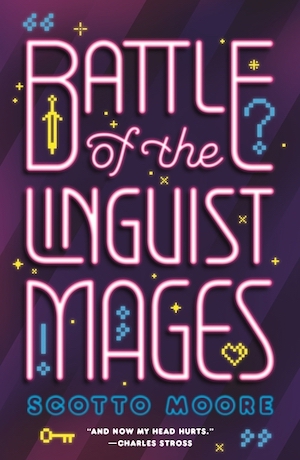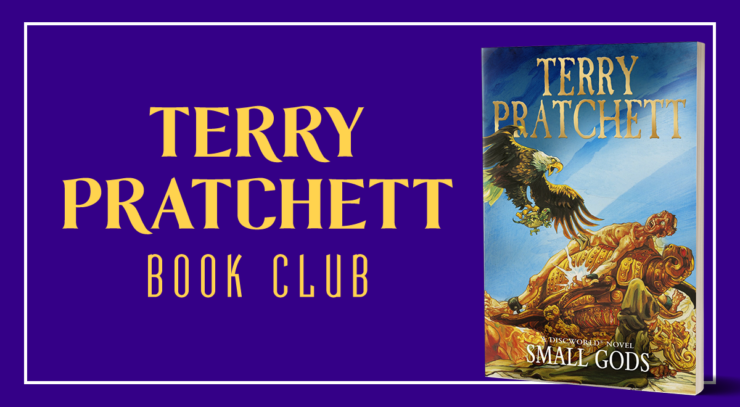And now we turn to thoughts of a more philosophical bent on the Disc, while we begin hanging out with some Small Gods.
Summary
We are introduced to the History Monks, who keep the books of History. Lu-Tze is sent to observe Omnia; the time of the Eighth Prophet is upon them. In the Omnian Citadel, the novice Brutha is gardening when he hears a voice. He is worried about it, so he brings his concern to one of the novice masters, Brother Nhumrod, who lectures him on evil voices that will tempt him to do wrong. Brutha hears the voice again in the garden; it is a one-eyed tortoise who claims to be the Great God Om. Deacon Vorbis is the leader of the Omnian Quisition, and he tortures his (former) secretary for information on heretics, then talks to two other priests—Fri’it and Drunah—about handling Ephebe and the heathens who live there. They are supposed to parley with the Ephebans, but Vorbis wants to lead the party and bring a war to Ephebe due to what they did to “poor Brother Murdock.” In the meantime, the Turtle Movement meets in secret, a secret group that means to rescue a figure named Didactylos and stop Vorbis.
Buy the Book


Battle of the Linguist Mages
Brutha shows the tortoise to Brother Nhumrod, but he can’t hear it speak and decides it’s better for eating. Brutha saves the tortoise, but insists that he cannot be the Great God Om, and shows him the statues and paraphernalia associated with the faith while quoting scripture. Drunah and Fri’it meet to discuss Vorbis’s holy war plans and decide to go along with the wave for now. Brutha continues to question the tortoise, who doesn’t know much about all their religious books and rules, despite their religion claiming that this information came directly from Om himself. The tortoise does seem to know everything about Brutha’s life, however—which sends Brutha into a panic. Vorbis comes across Brutha holding his fingers in this ears, and asks what ails him. At the sight of him, Brutha faints. Vorbid sees the tortoise and turns it onto its back, weighing it down, while he turns back to Brutha.
Vorbis talks to Brother Nhumrod about Brutha and learns that the young man cannot read or write (it just doesn’t seem to sink in), but that he has an eidetic memory of sorts. Vorbis asks to see him once he’s recovered. Om lies on his back in the sun, thinking of what he’s done; he didn’t actually watch everything his followers did, but he was able to pull thoughts from Brutha’s head, which is how he seemed to know his history. He knows he shouldn’t have done it, and now it seems he’s going to die (gods can actually die from more than a lack of belief) because he can’t turn over and it’s getting hotter and there’s an eagle nearby—who had earlier dropped him on a compost heap, oddly enough. Almost as though something were intervening, which is impossible because he’s the divine intervention. Lu-Tze comes over and turns the tortoise upright, saving his life. Om wanders the Citadel, coming upon the things that have changed over millennia; the Quisition’s cellar where torture occurs, and the Place of Lamentation, where poor believers pray for the god’s help. Om is kicked around the floor by unknowing supplicants at prayer, and an eagle spots him for lunch.
Brutha is brought to Vorbis’s chambers and is asked about the room he entered through to give an example of his memory, which he recalls perfectly. He is told to forget this meeting and dismissed. He goes to talk to Lu-Tze before hearing the tortoise in his head again, calling for his help. Brutha accidentally walks in front of the procession of their highest priest, but he finds the tortoise and tells him about his mission for Vorbis to Ephebe. Om doesn’t much like Vorbis, and also insists on being taken with Brutha—who seems to be the only true believer in the entire Citadel. Brother Fri’it is trying to pray, but he can’t remember the last time he’s done so and meant it. He knows Vorbis is aware of his betrayal, of the fact that he appreciates foreign lands and the Turtle Movement. Just as he decides to take up his sword and go kill an exquisitor, Vorbis shows up to his chambers with two of his inquisitors in tow. Next morning, Brutha puts Om in a wicker box and the traveling group to Ephebe arrives in the courtyard. Vorbis informs one Sargeant Simony that Fri’it will not be accompanying them.
Commentary
A discussion of this book seems like it should begin with a preface or two, so that people know where I’m coming from because religion is a thorny sort of subject that people can (and do) take very personally. So here’s the deal: I’m an agnostic in a pretty literal sense, being that I do not personally believe in any god, but also contend that it is impossible for me to know what’s beyond my perception. From a cultural standpoint, I was raised by two non-practicing parents, one Jewish, the other Episcopal. Of those two heritages, I identify with the former, and would comfortably call myself a secular Jew. (The legitimacy of that vantage point varies greatly depending on who you’re talking to, but is a known stance that has existed in Judaism for at least centuries, if not longer. You can be Jewish without believing in God, and in fact, Judaism commonly requires an active questioning on faith-based subjects up to and including the existence of God.)
We should also begin this discussion with the acknowledgement that Pratchett received fan mail about this book from believers and atheists, both sides lauding him for supporting them. Which is relevant for obvious reasons, I should think.
Of course, whether this text reads as pro-or-anti religion to you, this story is very much a discussion around which aspects of religion are beneficial to humankind, and which are decidedly not. Pratchett prods at those issues in a manner even more forthright than what we’ve seen in his earlier work; the plain deadpan quality in his explanation of everything the Quisition does (it’s torture, there’s really no way around that); the acknowledgement that many people pray out of habit rather than faith; the vehement denial of any form of scientific inquiry if it’s even mildly puzzling to tenets of scripture.
There’s also room for the discussion that faith is a thing created by people, and the need to keep it flexible for that reason alone. Brutha’s quotation of the scriptures to Om leads the god to admit that he doesn’t remember insisting upon many of the commandments and laws that the Omnians count as gospel. Those interpretations (perhaps even embellishments or outright changes?) were made by human men, who in turn built this religion to suit purposes and ideas of their own. I’ve gotten flak in the past for explaining that to my mind, all religious texts are a form of mythology, but that is a large part of my reasoning there—they are written, translated, and, yes, even altered by people. We’ve got the history to prove it, which is also referenced within this novel: The mention of an Om disciple who was tall with a beard and staff and “the glow of holy horns shining out of his head” is a reference to a translation error from Hebrew about Moses coming down from Mount Sinai. (The phrase in question could be translated as “radiant” or “horns” depending on the context—oopsies, I guess?)
I feel like Pratchett sticks to a lane in this book—obviously the presence of Lu-Tze and his mobile mountains invokes Taoism, but it’s waiting there on the outskirts of this story because Omnia has a distinctly Medieval Catholic bent to it. We’re dealing with the sort of inquiries that occurred in Galileo’s time (and indeed, there is reference to him in “the Turtle Moves” phrasing), and the horrors wrought by the Spanish Inquisition. We’re also dealing with a very specific mode of zealotry that is being wielded in this case by a single person. The framework of this story is serving as a stand-in for any number of atrocities committed across history in the name of religion.
But at the center we have Brutha and Om, a true believer and his god, with their comical meetcute and their puzzled back-and-forths as they struggle to make sense of the current situation. We’ll have to wait until next week to get into the interplay of religion and philosophy that really powers this book.
Asides and little thoughts:
- There’s a point where it’s said that Brutha puts a lot of effort into running, specifically that he runs from the knees. Which probably means that he’s pretty darned fast; I took a class in Alexander Technique once, and our teacher always talked about our perception of speed, and how our instinct to tilt forward actually cost us on that front. For speed, you’re supposed to imagine that your steps begin with the movement of your knees and let that carry you forward. If you want to power walk more effectively (and reduce your chance of falling), be like Brutha and walk/run from your knees!
Pratchettisms:
When people say “It is written…” it is written here.
Time is a drug. Too much of it kills you.
And it all meant this: that there are hardly any excesses of the most crazed psychopath that cannot easily be duplicated by a normal, kindly family man who just comes in to work every day and has a job to do.
Fear is strange soil. Mainly it grows obedience like corn, which grows in rows and makes weeding easy. But sometimes it grows the potatoes of defiance, which flourish underground.
Someone up there likes me, he thought. And it’s Me.
The change in his expression was like watching a grease slick cross a pond.
Next week we read up to:
“Very big on gods. Big gods man. Always smelled of burnt hair. Naturally resistant.”










